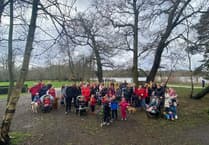PRACTISING what I preach, my lawn remains uncut for No Mow May. And the wildflowers remain stubbornly absent. A couple of milkmaids arrived in a flower bed, but the lawn, apart from a variety of grasses, and none of them very attractive, has had only dandelions and daisies. Last year, we did much better.
I know some people have sown seeds of wildflowers from packets, and had little success. The problem is that wildflowers succeed because they know what they want, and the beautiful flower meadows of the downland will not repeat on my soil.
We shall probably welcome the end of May, when we can mow the lawns – perhaps we will have to scythe them by that time.
We can cast a clout, as the old saying advises us. And we can sow seeds, but the Royal Horticultural Society (RHS) warns against planting too early during the coldest spring for several years, and suggests we wait until the end of the month. Gardening has been sold as a stress-reducing hobby, in this age when to be stressed is almost a must. Now gardeners, according to the RHS as reported in The Daily Telegraph, are becoming stressed because of what climate change is doing to their gardens.
I know what that viciously cold spell did to mine when even the plants in pots in my (unheated) conservatory had their soil frozen, and everything in my greenhouse died.
Many plants I thought had succumbed have shown signs of revival so even those with, currently, no signs of life won’t be dug up just yet. But I can see many visits to garden centres ahead of me.
I am due to open my garden for the Horsell Garden Safari next month so there is much to do, and many spaces to fill.
We have been told, many times, of the dangers of paving over our gardens, thus adding to the dangers of flooding. Now I have read that scientists are suggesting homeowners with artificial grass, or paving, should pay higher council tax.
According to a report by the University of Sheffield, “Some cities have lost as much as 50% of their green garden space during the last two decades, which is fuelling rising urban temperatures and biodiversity decline”.
Along with the threat of a rise in council tax for paving gardens, financial rewards were also suggested for those who maintain trees in their gardens. Which seems somewhat unfair on those with small gardens. Anyone for bonsai tree evening classes?
Friends in The Hague have received payment for removing paving stones and grassing their garden, so it is already a fact in some places.
For really big trees, I would suggest a visit to Brookwood Cemetery. There are regular guided walks organised by Brookwood Cemetery Society. On Sunday 4 June, starting at 2pm, there are several tours to choose from:
Introductory Walk North Side, led by Margaret Hobbs, will to show the beauty, interesting monuments, and people who chose Brookwood as their final resting place.
Lady Doctors and First World War Military Hospital, led by Jenny Mukerji, will teach learn about two very early ladies who qualified as doctors. Visit ladies who opened their houses as military hospitals during the First World War and visit the graves of First World War nurses and lady doctors.
Scientists, led by Alison Leech, will include eminent scientists, all Fellows of the Royal Society, with subjects ranging from fossils and geology to wine and solar cycles.
Booking may be done by email at [email protected] or by calling 07714 289375. A £5 donation includes refreshments.
On 13 May we went to Surrey Day at Brookwood Cemetery. An interesting nature trail had been set up for visitors to follow enabling us to glimpse the roe deer which will probably, henceforth, be known as the Attenborough Deer, following their appearance on Sir David’s television series Wild Isles.
There are other creatures, including birds – the ravens were a noisy lot – butterflies and even ants were drawn to our attention.
In the pond we saw hundred, if not thousands, of tadpoles – this must be the year for them. Also we spotted a quite large fish, but the water was too murky for us to get a good look at it.
There is a wonderful variety of trees. As the Trail Notes puts it: “Brookwood Cemetery is truly a museum of trees.”
If you want to see really wild wildflowers the cemetery is the place to visit. These have found their own way there: they have not come from seed packets. They know the conditions they want and have found them. Beautifully.




